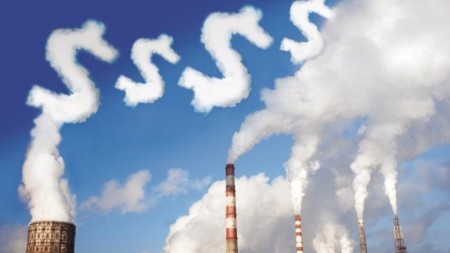Current climate policies put Australian businesses and jobs at risk

Australian companies that export goods and/or services should be asking themselves whether they are happy for the Federal Government to continue to put their potential future viability at risk, writes Dr Anthony Horton.
According to a World Bank announcement on Sunday September 20, the number of carbon pricing schemes around the world has nearly doubled from 20 to 38 since 2012, and the schemes account for approximately 12% of the world’s greenhouse gas emissions.
Rachel Kyte, a Vice President and Special Envoy for Climate Change at the World Bank stated in a teleconference that a price on carbon for Governments and businesses alike is inevitable. The World Bank’s study of the current schemes showed that the price per tonne around the world ranged from less than $1 in Mexico to $130 in Sweden.
Rachel Kyte, a Vice President and Special Envoy for Climate Change at the World Bank stated in a teleconference that a price on carbon for Governments and businesses alike is inevitable. The World Bank’s study of the current schemes showed that the price per tonne around the world ranged from less than $1 in Mexico to $130 in Sweden.
In related news, the number of companies that have internal carbon pricing has tripled since last year. In setting such a price, companies essentially incentivise decreased reliance on fossil fuels, and can help to mitigate the effects of current or proposed future regulation. According to Environmental not for profit group CDP, the prices currently range from $1-$357 per metric tonne.
Special Advisor to CDP Paula DiPerna stated that companies would welcome certainty from Regulators and are therefore already planning for mandated emission limits in the future. The 435 companies named in the report include the Campbell Soup company, Black and Decker, Exxon Mobil and Nissan.
CDP North America President Lance Pierce commented that each company essentially anticipated future emissions prices and saw internal carbon pricing as an essential part of building a foundation for their future competitive advantage.
What does this mean for Australian companies?
These two reports are the latest in an increasing number that point to carbon pricing being an integral part of operating a business and one of the bases upon which companies will select and manage their suppliers of goods and/or services. It also points to a shift in the way competitiveness and corporate social responsibility will be defined and maintained going forward.
In previous blogs I have highlighted many large multinational companies that have implemented internal pricing and other measures including monitoring and reducing their carbon and greenhouse emissions, investing in renewable energy and selecting suppliers that do likewise. In response, they are decarbonising their entire operations and a number have found that their market share (and returns to shareholders) has increased, in no small part due to marketing their “greener” image compared to their competitors from a corporate social responsibility perspective.
While some may say that multinational companies have sufficient liquidity to adopt a speculative stance on Governments implementing carbon trading at national levels, it is also fair to say that Governments recognise the importance of certainty in terms of policies and legislation such that companies can maintain their competitiveness and growth which facilitates increased employment opportunities.
Given that the current Australian Government does not have mechanisms in place to incentivise domestic companies to internally price carbon, monitor and reduce their carbon and greenhouse gas emissions, invest in renewable energy or select suppliers that do likewise, it is conceivable that Australian companies will be vulnerable if they have an international competitor that incorporates each of the these into their operations and produces what is considered an identical product. Under this scenario the viability of the company and the jobs of the employees are at serious risk, especially if the international market constitutes the majority of the Australian company’s income.
Ultimately, Australian companies that export goods and/or services need to ask themselves whether they are happy for the Federal Government to continue to put their potential future viability (and the jobs of their employees) at risk or not, and if not, what they are going to do about it.
This article was first published on theclimatechangeguy.com.au.
 About the author: Anthony Horton holds a PhD in Environmental Science, a Bachelor of Environmental Science with Honours and a Diploma of Carbon Management. He has a track record of delivering customised solutions in Academia, Government, the Mining Industry and Consulting based on the latest wisdom and his scientific background and experience in Climate/Atmospheric Science and Air Quality. Anthony’s work has been published in internationally recognised scientific journals and presented at international and national conferences, and he is currently on the Editorial Board of the Journal Nature Environment and Pollution Technology. Anthony also blogs on his own site, The Climate Change Guy.
About the author: Anthony Horton holds a PhD in Environmental Science, a Bachelor of Environmental Science with Honours and a Diploma of Carbon Management. He has a track record of delivering customised solutions in Academia, Government, the Mining Industry and Consulting based on the latest wisdom and his scientific background and experience in Climate/Atmospheric Science and Air Quality. Anthony’s work has been published in internationally recognised scientific journals and presented at international and national conferences, and he is currently on the Editorial Board of the Journal Nature Environment and Pollution Technology. Anthony also blogs on his own site, The Climate Change Guy.









2 comments
Login here Register here-
Möbius Ecko -
Mark Needham
Return to home pageHow long until those countries and businesses who undertake a carbon pricing regime start to penalise those they deal with who don’t?
The Liberals in opposition and now in government have always stated we cannot undertake a carbon pricing regime as it would harm our economy and competitiveness. Now its other countries and businesses who are costing in carbon so its only logical that they will penalise Australia that hasn’t.
Money for Jam, Hey.
Of course the trading will continue to increase at an exponential rate.
and. “the schemes account for approximately 12% of the world’s greenhouse gas emissions.”
these schemes should be shut down, quick, very quickly, causing that much pollution.
Mark Needham